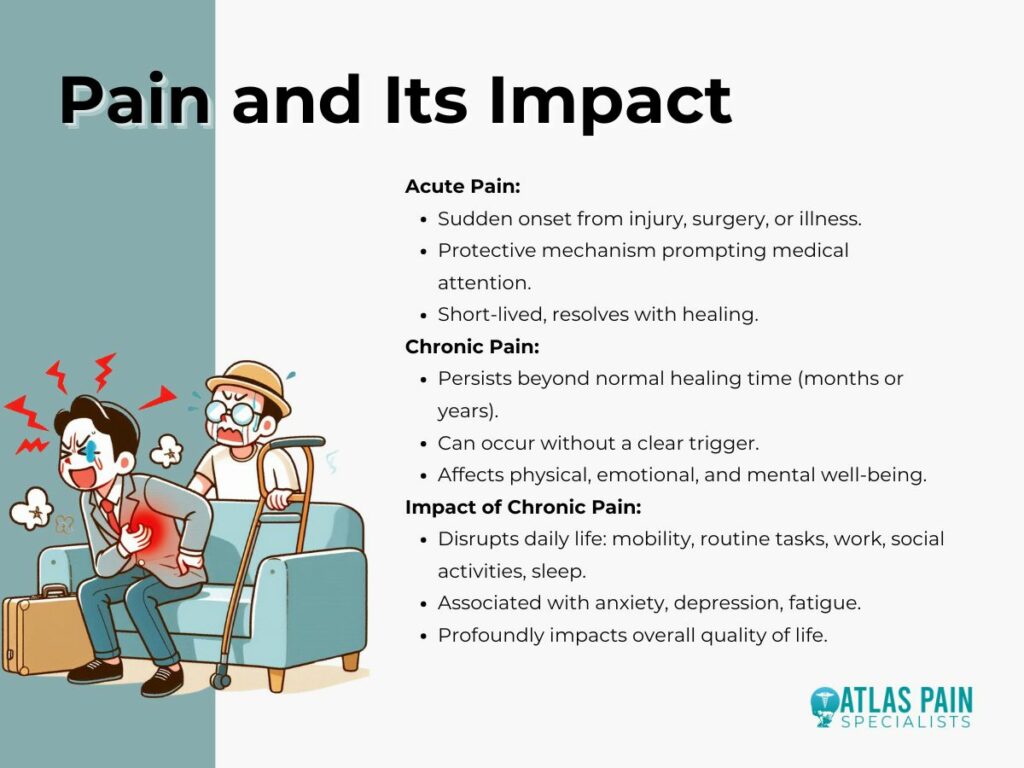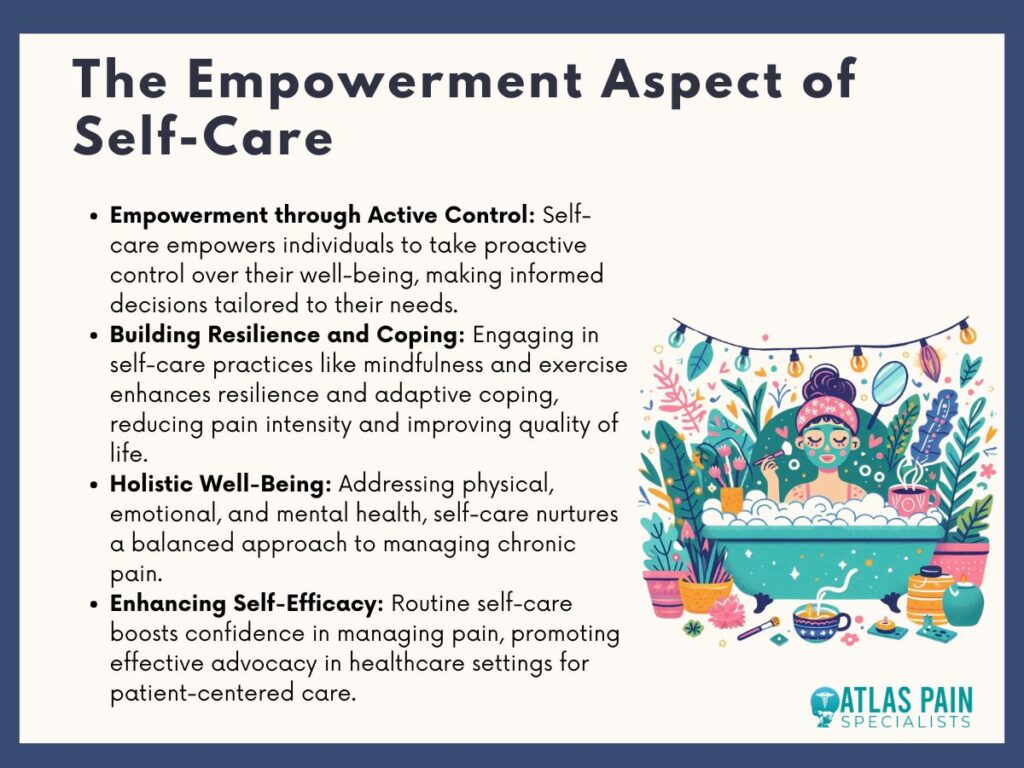

The Role of Self-Care in Pain Management: Empowerment and Wellness
Pain, whether acute or chronic, significantly impacts one’s quality of life and overall well-being. It transcends mere physical discomfort, often permeating into emotional and mental spheres, affecting everything from daily activities to relationships.
Effective pain management is, therefore, not just about alleviating physical symptoms but also about restoring a sense of normalcy and empowerment in individuals' lives. Self-care in pain management encompasses a spectrum of proactive measures that individuals can undertake to manage their pain more effectively, complementing medical treatments and therapies.
It entails acknowledging and treating pain's psychological and emotional costs in addition to its physical effects. Self-care encourages people to take an active part in their recovery process by establishing a proactive attitude to well-being. This builds resilience and adaptable coping mechanisms.
Pain and Its Impact
Pain is a complex sensory and emotional experience that varies widely among individuals. It serves as a critical physiological response to potential or actual tissue damage, signaling the need for attention and action.

- Acute pain typically arises suddenly from injury, surgery, or illness, serving as a protective mechanism that prompts individuals to seek medical assistance and limit further harm. It is usually short-lived and resolves as the underlying cause heals.
- Chronic pain persists beyond the normal healing time, often lasting for months or even years, and can occur without any clear trigger. Chronic pain not only affects the physical body but also exerts a profound impact on emotional and mental well-being.
The persistent nature of chronic pain can lead to significant disruptions in daily life, including limitations in mobility, challenges in performing routine tasks, and interference with work, social activities, and sleep patterns. Chronic pain is frequently accompanied by comorbid conditions such as anxiety, depression, and fatigue, which further exacerbate its debilitating effects on overall quality of life.
Types and Causes of Pain
Pain can be categorized based on its origin and characteristics.
- Nociceptive pain originates from the activation of nociceptors in response to tissue damage or inflammation
- Neuropathic pain results from damage or dysfunction of the nervous system itself.
Pain can also be classified based on its location, i.e
- Somatic pain affects the musculoskeletal system.
- Visceral pain originating from internal organs.
- Duration (acute versus chronic).
What is Self-Care?
Self-care encompasses a spectrum of proactive measures that individuals can undertake to manage their pain more effectively, complementing medical treatments and therapies. Self-care in the context of pain management refers to deliberate actions taken by individuals to promote physical, emotional, and mental well-being.

It involves recognizing and addressing not only the physical manifestations of pain but also its emotional and psychological toll.It is important to manage pain effectively as it empowers individuals to take an active role in their healing journey.
Self-care in pain management encompasses various components, including physical, emotional, and mental aspects.
Components of Self-Care in Pain Management
Self-care in pain management comprises several essential components that collectively contribute to enhancing overall well-being and reducing the impact of chronic pain.
- Physical Self-Care
Physical self-care involves practices that directly address the physical symptoms and limitations associated with chronic pain. This includes engaging in regular exercise and movement tailored to one's abilities and condition.
- Physical activity not only helps improve flexibility and strength but also releases endorphins, natural pain-relieving chemicals in the body.
- Techniques such as heat therapy (e.g., using heating pads or warm baths) and cold therapy (e.g., ice packs) can provide temporary relief from pain and inflammation.
- Proper nutrition and hydration are also crucial components of physical self-care, as they support overall health and can influence pain perception and management.

- Emotional Self-Care
Emotional self-care focuses on managing the psychological and emotional aspects of living with chronic pain. This includes
- Practicing stress management techniques such as mindfulness meditation, deep breathing exercises, or progressive muscle relaxation. These techniques help reduce stress levels, which can exacerbate pain and contribute to emotional distress.
- Seeking social support from friends, family, or support groups. Sharing experiences with others who understand can provide emotional validation, reduce feelings of isolation, and offer practical advice and encouragement.
- Engaging in activities that bring joy and relaxation, such as hobbies, creative pursuits, or spending time in nature, can help improve mood and overall well-being.

- Mental Self-Care
Mental self-care involves adopting strategies to foster a positive mindset, manage cognitive challenges, and build resilience in the face of chronic pain.
- Cognitive-behavioral techniques, such as cognitive restructuring or guided imagery, help individuals challenge negative thought patterns and develop more adaptive coping strategies.
- Practicing mindfulness and relaxation techniques can also help individuals stay present and manage pain-related anxiety or anticipatory fears.
- Engaging in cognitive stimulation through reading, puzzles, or learning new skills can keep the mind active and distract from pain sensations.
- Setting realistic goals and priorities, pacing activities, and practicing self-compassion are important aspects of mental self-care that promote a balanced approach to managing chronic pain.
The Empowerment Aspect of Self-Care
Self-care in pain management plays a pivotal role in empowering individuals, offering them agency and control over their well-being amidst chronic pain challenges.

- Taking Active Control
Self-care shifts the focus from passive treatment to proactive engagement. It encourages individuals to take ownership of their health by adopting practices that promote physical, emotional, and mental well-being.
This active involvement fosters a sense of control over pain management strategies, empowering individuals to make informed decisions that align with their unique needs and preferences.
- Building Resilience and Adaptive Coping
Self-care activities give people the tools they need to become more resilient and create flexible coping strategies. Through the integration of strategies like mindfulness, stress reduction, and physical exercise, people can more effectively manage the psychological and emotional effects of chronic pain.
This proactive approach not only reduces the intensity of pain symptoms but also enhances overall quality of life by promoting a sense of mastery over pain-related challenges.
- Promoting Holistic Well-Being
Self-care promotes holistic well-being by addressing the interconnected dimensions of health affected by chronic pain. Beyond alleviating physical symptoms, it attends to emotional and mental health needs, nurturing a balanced approach to pain management.
Activities like socializing, pursuing hobbies, and practicing relaxation techniques contribute to emotional resilience and mental clarity, enhancing overall life satisfaction despite the presence of chronic pain.
- Enhancing Self-Efficacy
Self-care routines foster self-efficacy, or the conviction that one can successfully handle and overcome difficulties. People can boost their confidence in their ability to manage pain by actively engaging in their own treatment and setting realistic goals.
In addition to giving people more confidence in their daily lives, this self-belief also helps them advocate more effectively in healthcare settings, building cooperative relationships with medical professionals and guaranteeing individualized, patient-centered care.
Implementing Self-Care Practices
Implementing effective self-care practices in pain management involves a detailed and personalized approach aimed at integrating various strategies into daily routines to enhance resilience, improve quality of life, and support overall well-being.
- Creating a Personalized Self-Care Plan
Creating a personalized self-care plan begins with a comprehensive assessment of individual needs, preferences, and current health status. This involves identifying specific goals related to managing chronic pain, such as reducing pain intensity, improving mobility, enhancing emotional resilience, and promoting mental clarity.
Each goal should be realistic, measurable, and tailored to individual capabilities and circumstances. Once goals are established, individuals can outline a variety of self-care activities that address physical, emotional, and mental aspects of well-being.
For physical self-care, activities may include tailored exercise routines to improve flexibility and strength, incorporating techniques like yoga or swimming that are gentle on joints, and practicing methods such as heat therapy or cold compresses for pain relief. Nutrition also plays a crucial role; individuals should consider consulting with a dietitian to develop a diet plan that supports inflammation reduction and overall health.
- Setting Realistic Goals and Priorities
Setting realistic goals is essential for sustainable self-care practices. Begin by prioritizing activities that provide the most significant impact on pain management and well-being.
Start with small, achievable steps and gradually increase the intensity or duration of activities as comfort and ability permit. For example, setting a goal to engage in 20 minutes of moderate exercise three times per week can be a realistic starting point for someone managing chronic pain.
It's important to prioritize self-care activities that resonate personally, ensuring they fit seamlessly into daily routines. This might involve scheduling specific times for self-care, integrating activities into existing routines, and establishing reminders or cues to maintain consistency.
Integrating Self-Care into Daily Life
Integrating self-care into daily life is essential for maintaining consistency and maximizing the benefits of holistic well-being practices in pain management.
- Developing Consistent Habits
Consistency is key to the effectiveness of self-care practices. Begin by identifying specific times and routines where self-care activities can be seamlessly integrated into daily life.
This may involve setting aside dedicated time each day for activities such as meditation, stretching exercises, or relaxation techniques.
- Incorporating Self-Care Throughout the Day
Integrate self-care practices throughout the day to support continuous pain management and stress reduction. This can include incorporating brief relaxation exercises during work breaks, practicing mindfulness techniques during daily commutes, or engaging in light physical activity such as walking or stretching at regular intervals.
- Adapting to Changing Needs and Circumstances
Remain adaptable in implementing self-care practices to accommodate changing needs and circumstances. Life's demands may fluctuate, impacting energy levels, pain intensity, and overall well-being.
Be prepared to adjust self-care routines accordingly, whether by modifying the duration or intensity of activities, exploring new techniques or approaches, or seeking additional support when needed. Flexibility ensures that self-care remains relevant and effective in supporting overall pain management and improving quality of life.
- Creating Supportive Environments
Surround yourself with supportive environments and individuals who encourage and reinforce self-care practices. This may involve communicating needs and boundaries with friends, family, and colleagues, and seeking their understanding and encouragement.
Engaging in support groups or online communities can also provide valuable peer support, practical advice, and shared experiences that validate and enhance self-care efforts.
- Reflecting and Celebrating Progress
Regularly reflect on personal progress and achievements in integrating self-care into daily life. Celebrate milestones, both big and small, to acknowledge the positive impact of self-care practices on pain management and overall well-being.
This reflective practice reinforces motivation, boosts self-confidence, and encourages continued dedication to self-care.
The Link Between Mental Health and Chronic Pain
Including self-care techniques in pain treatment goes beyond treating physical symptoms and gives people the tools they need to actively participate in their own health. A holistic approach to well-being is fostered by modifying strategies establishing encouraging surroundings, and acknowledging one's own accomplishments on the path to managing chronic pain through self-care.
The relationship between chronic pain and mental health emphasizes how closely physical and emotional well-being are related. Stress, anxiety, and depression are just a few of the disorders that can arise from long-term pain's detrimental effects on mental health.
On the other hand, mental health problems can make pain feel worse and make it harder to use appropriate pain relief techniques. Self-care techniques such as mindfulness, cognitive-behavioral strategies, and social support contribute to alleviating mental health symptoms and improving overall quality of life for individuals living with chronic pain.
About Dr. Sean Ormond



